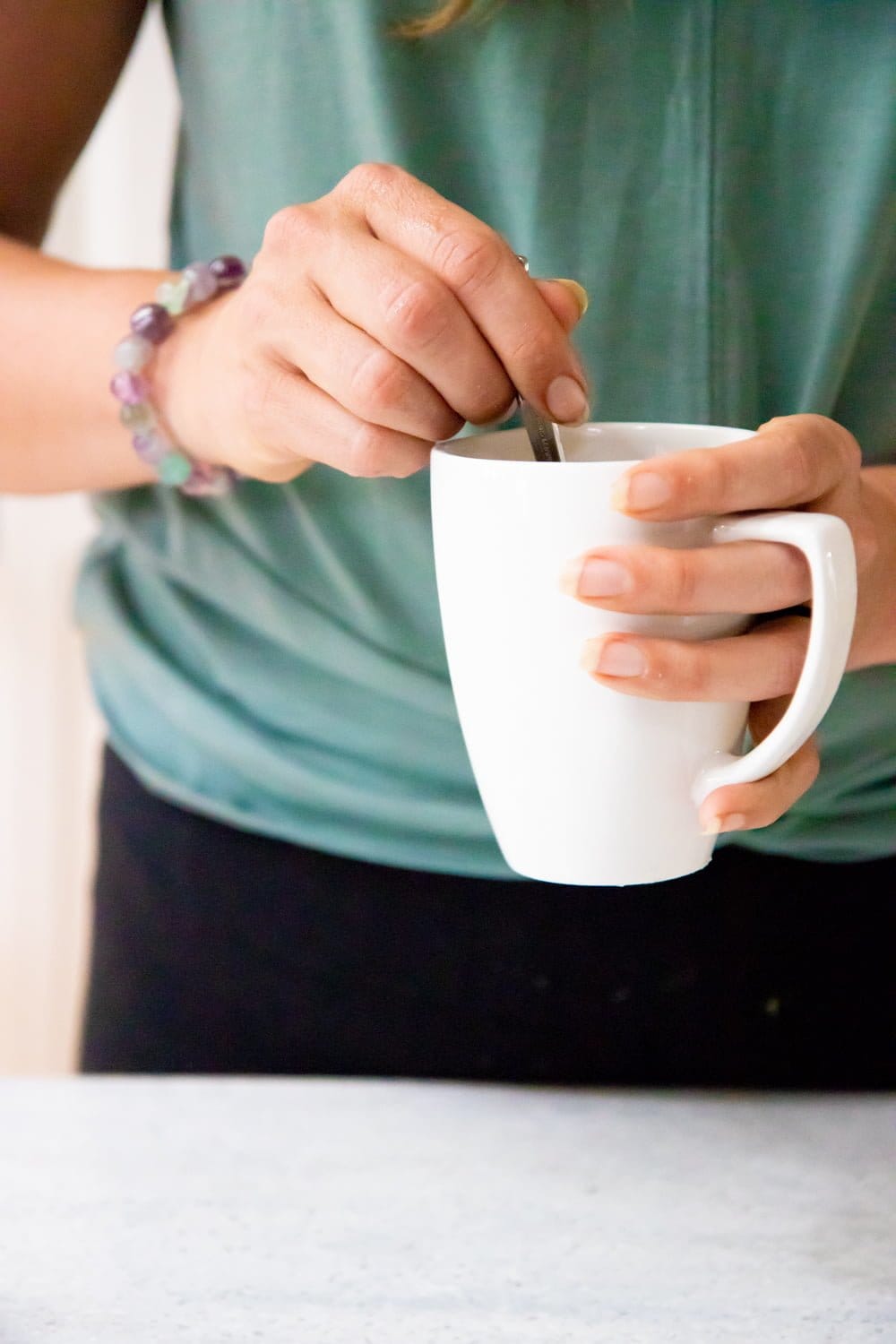I’m constantly amazed at the healing powers of a simple cup of tea. Even putting aside the medicinal benefits of using specific herbs targeted toward your ailments, just the ritual of brewing a cup of tea and taking a moment to yourself to sip on it is like giving yourself a great big hug.
When I’ve got a cold, I’m never far from a mug of hot herbal tea (with honey!). Not only does the warm liquid feel great on my scratchy throat, but I can use my herbal apothecary to craft tea blends that help me feel better in a jiffy.
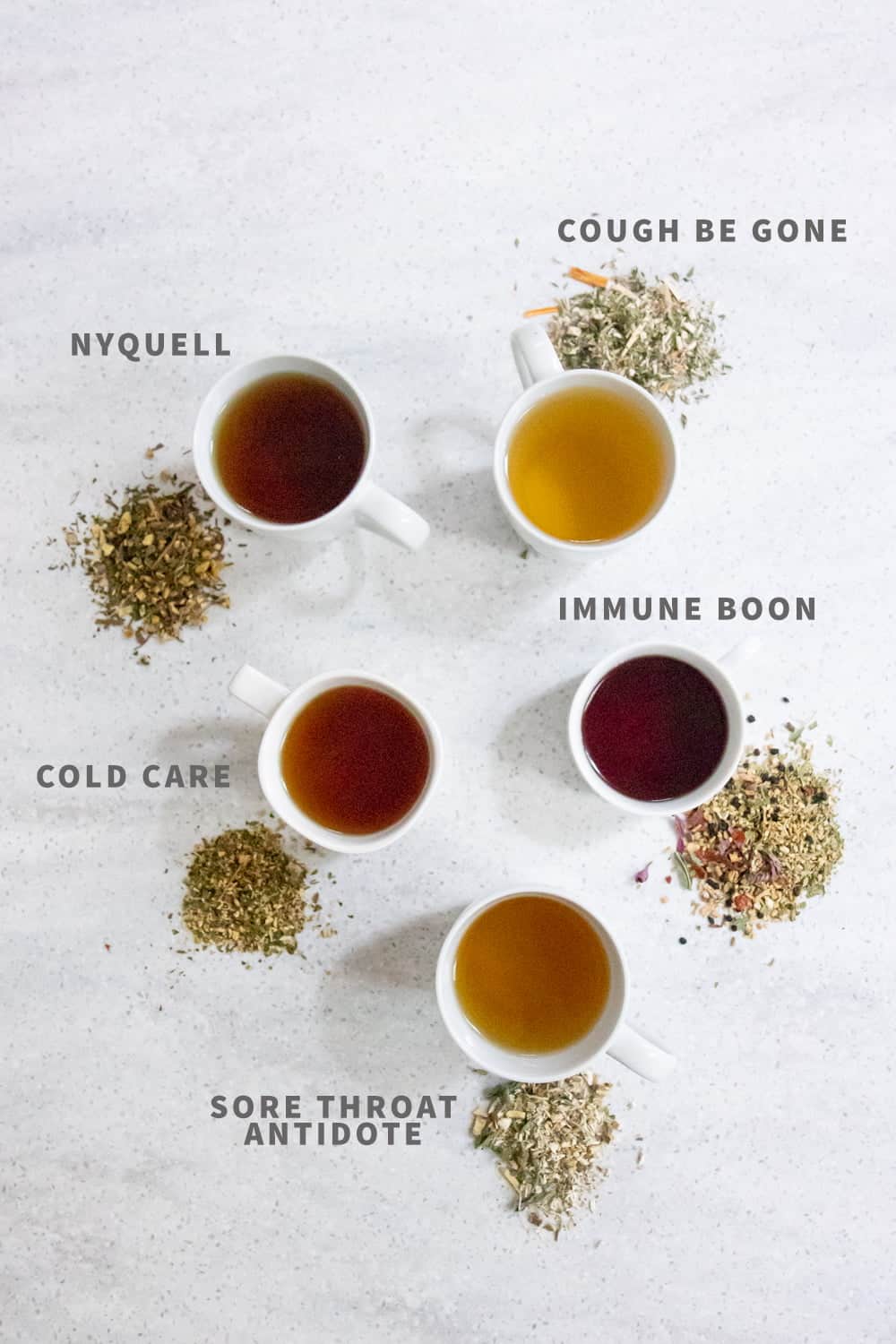
Before we dig into the actual five herbal tea blends that I use all cold and flu season long, I want to talk to you a little bit about brewing a cup of medicinal tea (AKA: an infusion). It’s a bit different from just brewing a cuppa for regular sipping.
How to Brew Medicinal Herbal Teas
The first difference is quantity. You can, of course, brew just a single cup of medicinal tea, but for the best benefits (and ease), you really want to brew a good quantity at a time—a quart is a good place to start. Then, instead of slamming it all in one sitting, you drink a small amount (about 1/2 cup) every hour throughout the day.
You can use a teapot, but my favorite vessels for medicinal tea are a quart-size Mason jar or a 34-ounce French press. Both work beautifully! I do not recommend brewing in a tea ball—you want your herbs to really be able to dance around and make you a beautiful cup of healing tea. If your herbs can’t move, they can’t release their healing compounds. Just like in the garden, it’s important to give your plants space!
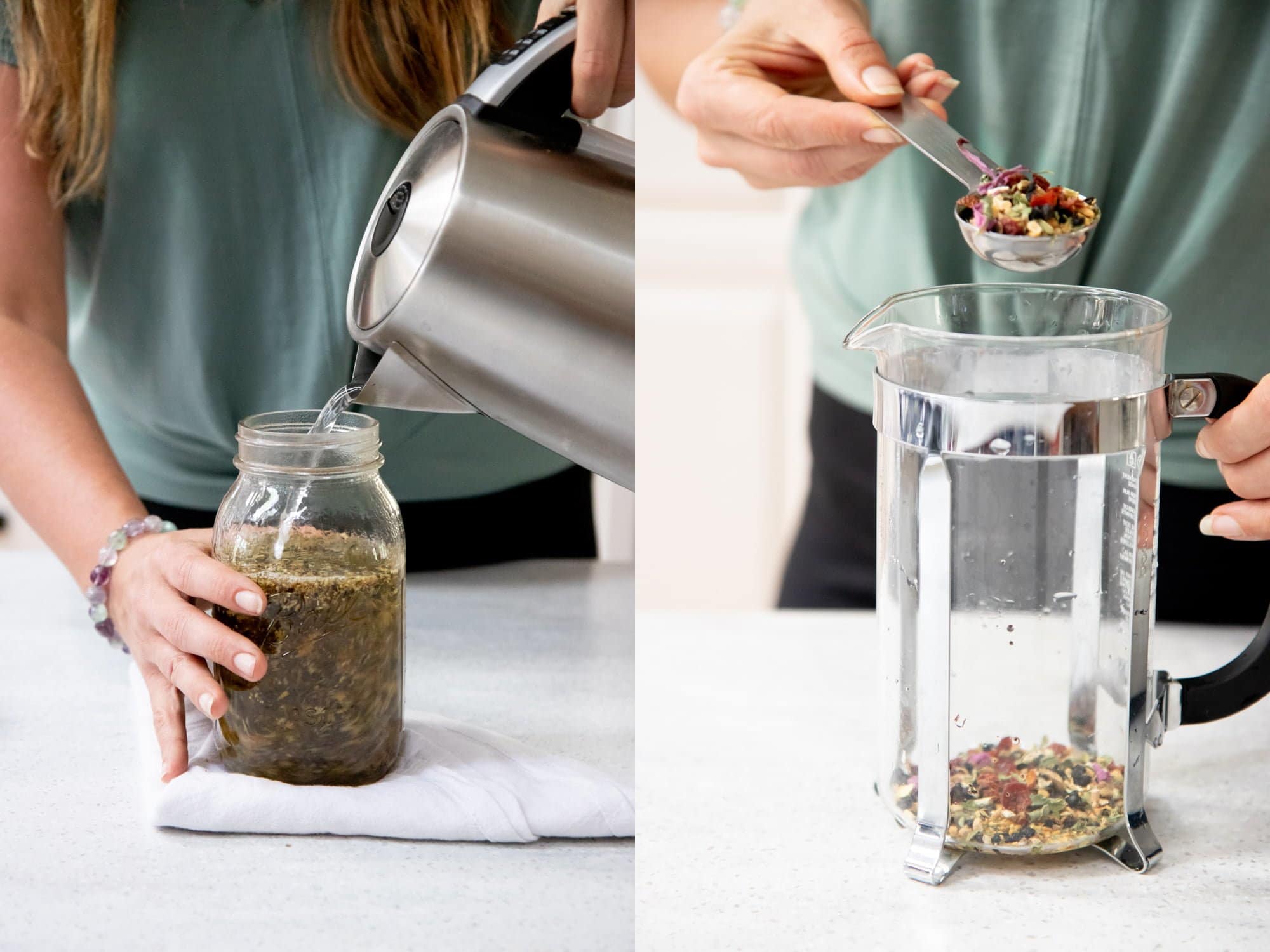
Just fill your jar or French press with an adequate amount of herbs (about 1/4 cup of the herbal tea blends listed below) and then cover with boiling water. Make sure to cover your container tightly. I go ahead and cap my Mason jars and put the lid on my French press. You can even go as far as covering the top of your French press with a tea towel to keep as much of the medicinal goodness inside as possible.

Then, you wait. A good cup of medicinal tea will take 30-45 minutes to brew. You really want to suck every last drop of medicinal compounds out of the herbs you chose.
A word of warning: brewing medicinal teas for this long can result in a pretty bitter end result. I’ve formulated the herbal tea blends below to taste good…ish, but just a heads up that they aren’t going to be the Chai Tea Latte you get at your local coffee shop. Add some honey and just imagine that every bitter sip is an army of herbal soldiers marching into your body to help out! Also: bitter foods are good for you! If you start drinking enough medicinal teas, you’ll eventually find yourself liking the bitter taste. I didn’t think it was possible, but it is!
Once the tea looks dark in color and strong in smell, you’re ready to strain, sweeten to taste, and sip. The French press makes it easy– just plunge and pour. If you’re using a jar, you’ll want to strain through a fine mesh sieve or a tea strainer.
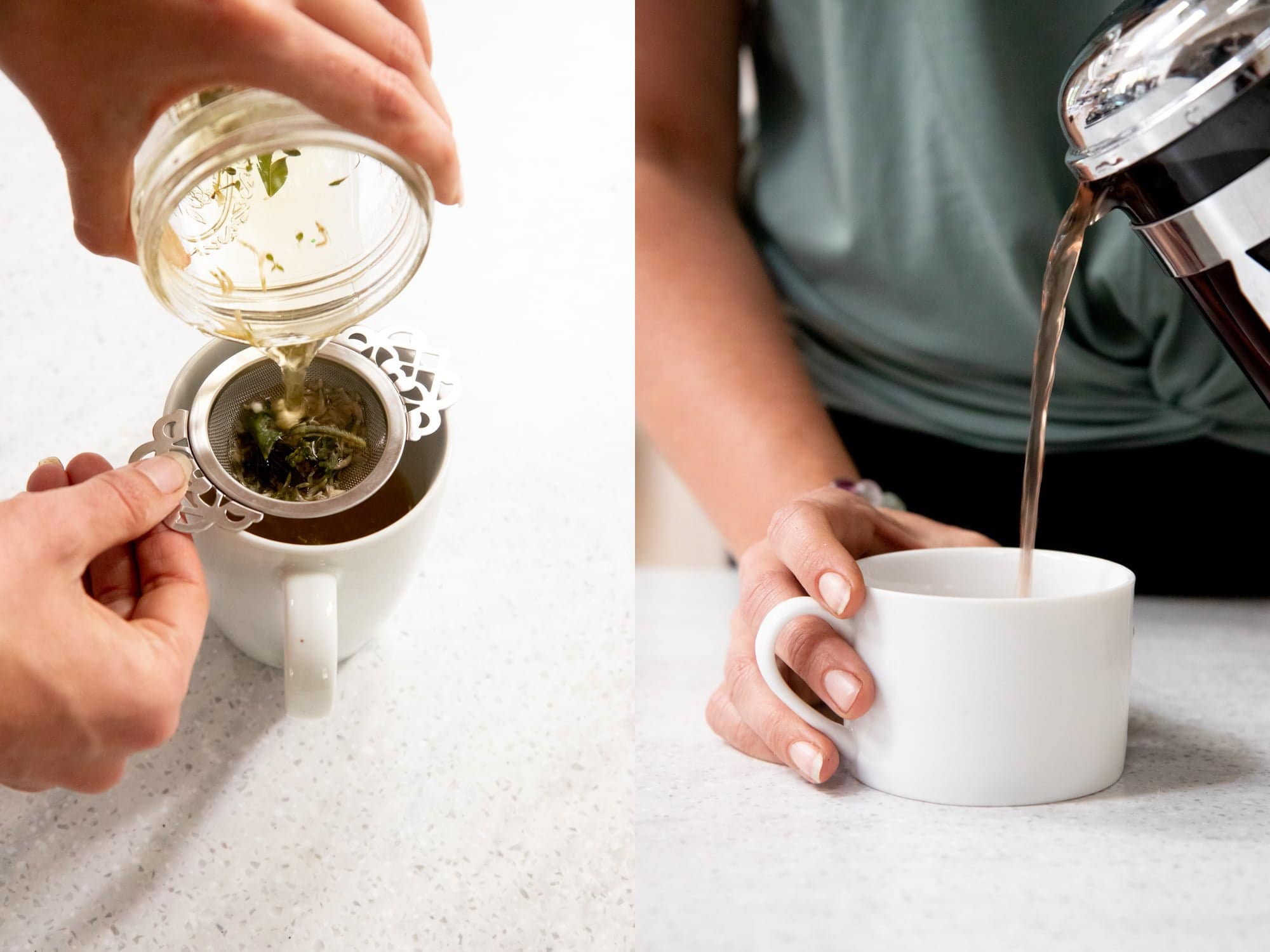
I recommend heating up the tea each time you drink it to at least body temperature or warmer. When you’re sick, anything you can do to raise your body temperature is going to help your immune system fight back—so hot tea and hot soup are your friends!
When it comes to the actual herbs listed in these blends, I purchase most of mine from Amazon. Just as long as you keep on top of which seller is providing the herbs, you can get really high quality herbs affordably (and quickly if you’re a Prime member). I’ve linked to all the herbs I personally use in the recipes below. Another amazing option for sustainable herb sourcing is Mountain Rose Herbs!
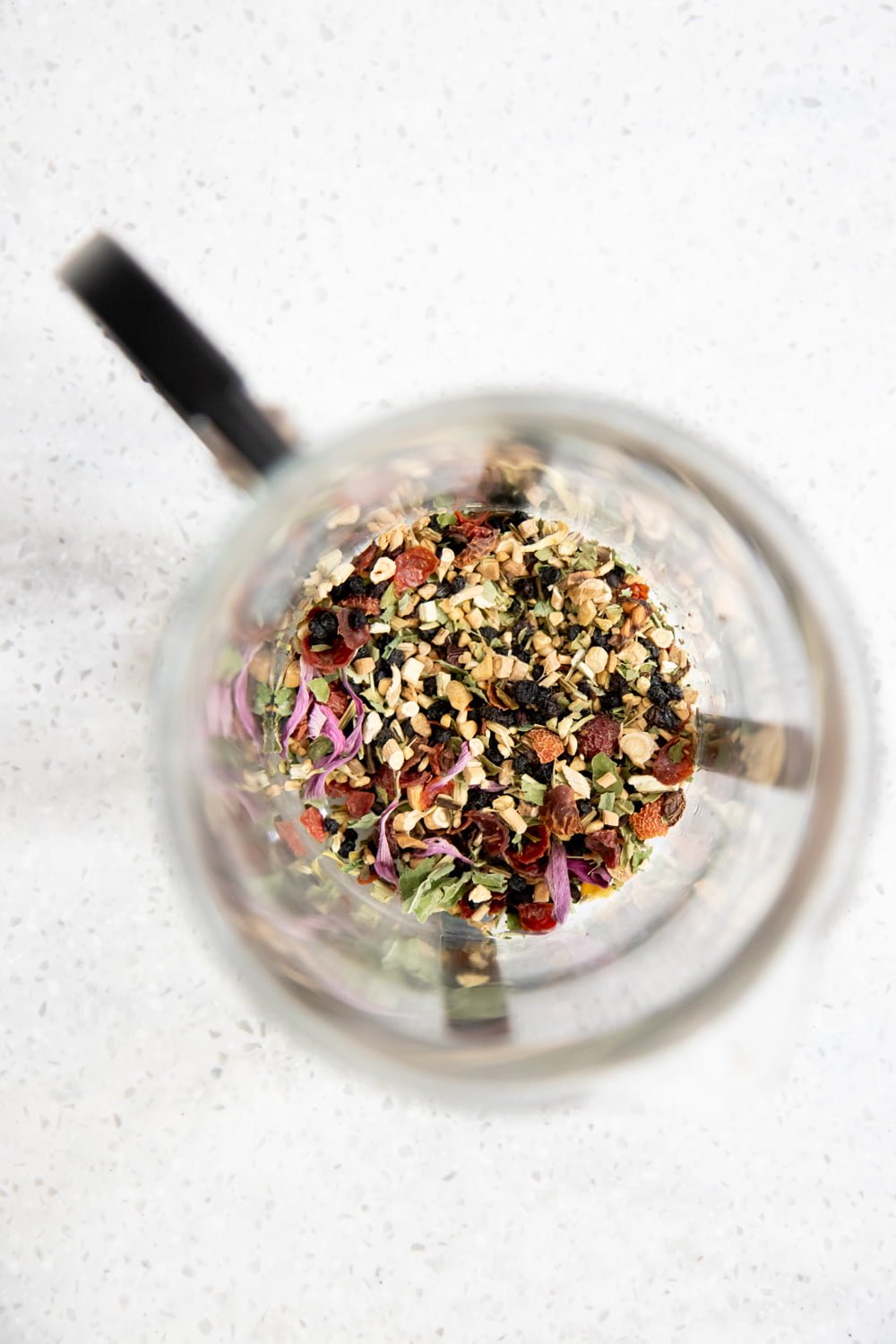
Starting an herbal apothecary can be a pricey investment, so if you’re just starting out, I recommend doing what I did—pick one blend and then buy the herbs you need to make it! Then, the next time you have an ailment, you can pick up some herbs for that. Before you know it, you’ll have a stocked herbal apothecary cabinet!
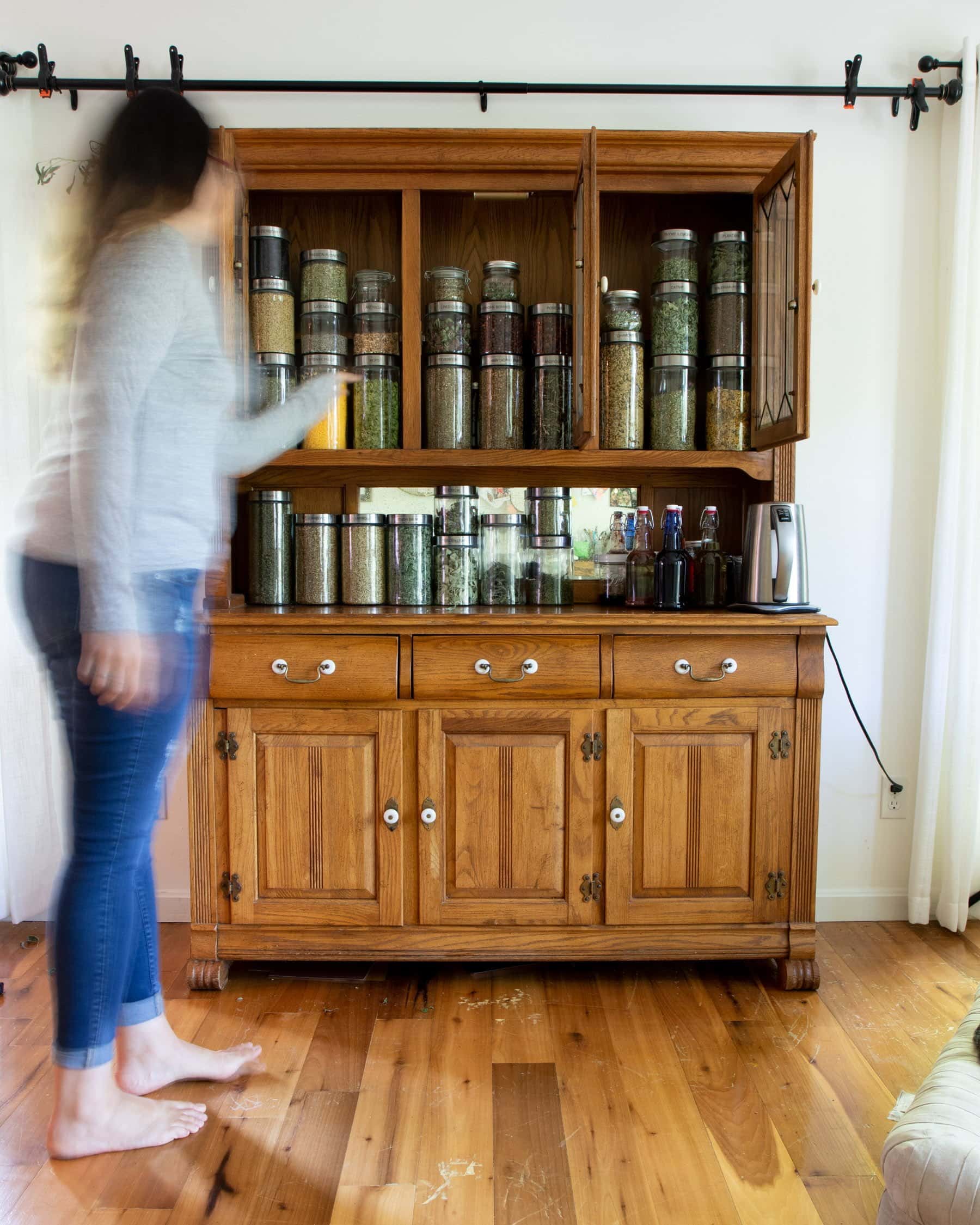
As with all of my home remedies, it is important that you check with a qualified health care professional before treating yourself or your family with any new herb. I am not a trained herbalist, naturopath, or health care professional, so these recipes are offered for informational purposes only.
Alright, let’s dig into the actual cold-busting herbal tea blends that I use with my family every fall and winter. I’ve set these up in the order I typically use them during the duration of a cold.
Immune Boon Herbal Tea
You know when you have the sneeze that feels a little weird or you just feel a little rundown or your throat just feels a little tickly? Your body is fighting something off, and it’s time to strengthen it’s resolve! Enter Immune Boon Herbal Tea (and Elderberry Syrup, too). This tea is formulated to give your immune system a shot in the arm for a short period of time at the beginning of an illness.
The base of this tea is echinacea, which we all know is a classic immune-boosting herb, but many of us don’t know that echinacea is only a short-term immune booster. Echinacea is the Popeye’s spinach to your immune system—but only for a day or two. It boosts your white blood cell count temporarily, and then after that, its effects drop off dramatically, and herbs that are specific to your symptoms are more appropriate. I drink this tea for the first two days I start to feel under the weather.
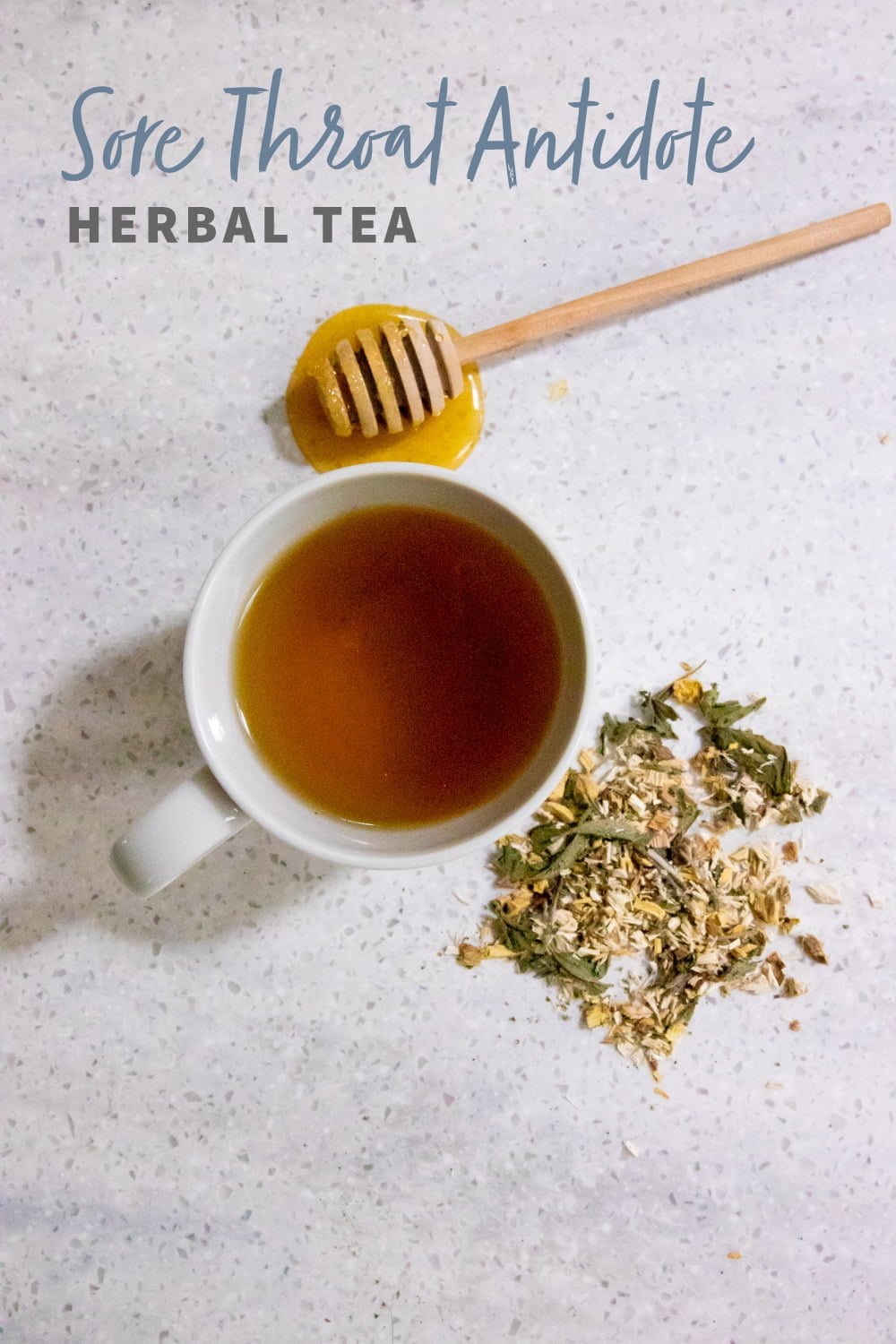
Sore Throat Antidote Herbal Tea
Alright, you’re fully sick now and your throat is on FIRE. It hurts to eat, to drink, and to talk. This herbal tea is your friend. Sage is a classic remedy for painful throats, and both licorice and marshmallow root are classic mucilaginous herbs—meaning they make the same gooey stuff that flax seeds and chia seeds make—which helps to soothe, coat, and protect your inflamed throat tissue. This particular tea tastes delicious (and since licorice is 50 times sweeter than sugar, doesn’t really need added sweetening), and I’ve been known to make it a half gallon at a time and constantly sip on it during the sore throat phase.
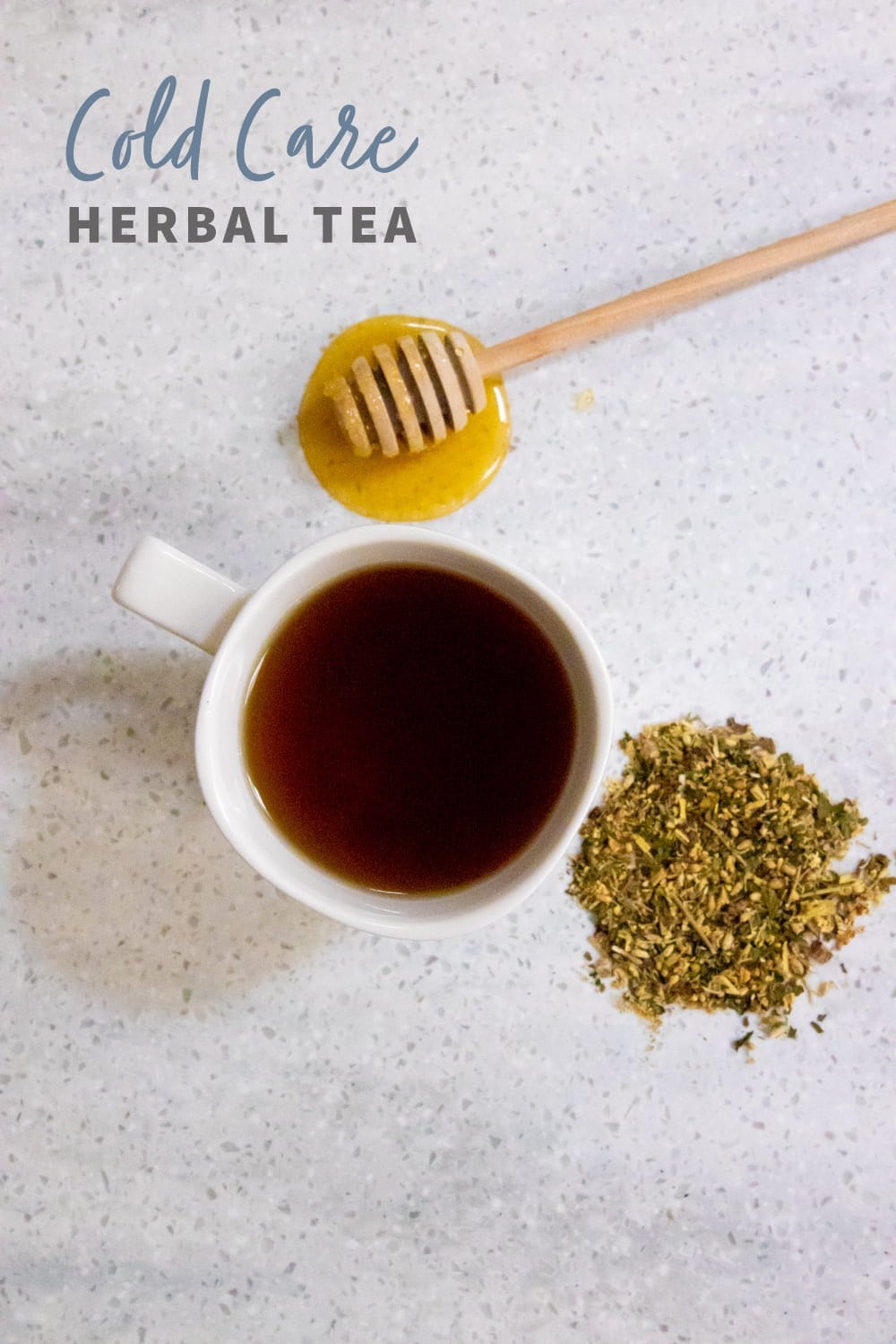
Cold Care Herbal Tea
You’re snotting, your head hurts, you just want this dang cold to be OVER! Now’s the time to give your immune system a little more help with the Cold Care Herbal Tea. The entire point of this tea is to get your body sweating, heated up, and killing that pesky virus. Both yarrow and elder flower are diaphoretic—meaning they induce sweating by gently raising your body temperature. Yarrow is also a powerful natural antimicrobial and antiviral.
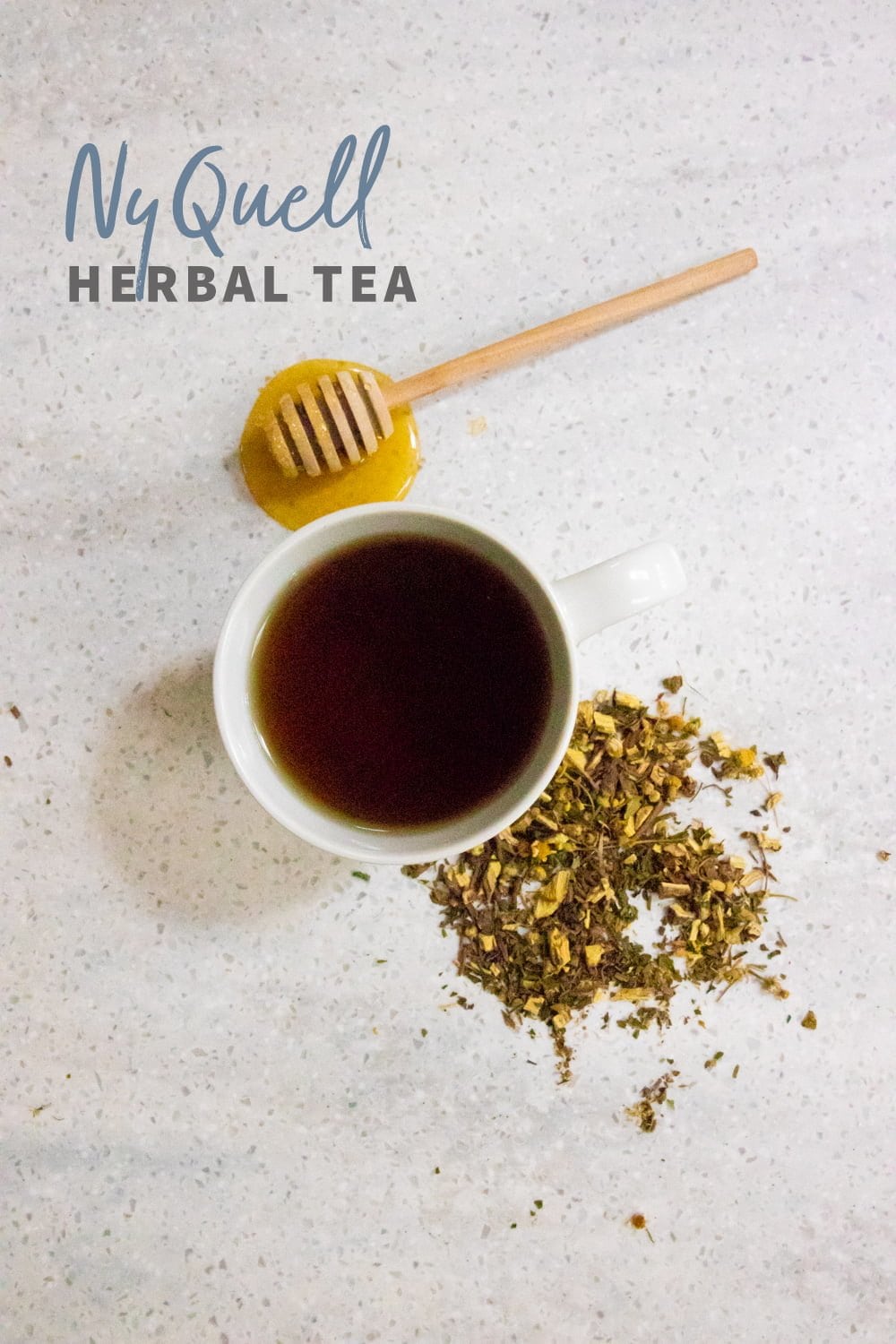
NyQuell Herbal Tea
You just want to sleep! But you’re coughing and sneezing and blowing your nose every three seconds—if you could just rest for a second, you might actually start to heal! Enter NyQuell tea. This is my much gentler, much kinder version of that green nighttime cold medicine you might be used to. The licorice root helps to sooth the mucous membranes while sweetening the tea (without added sugar that might keep you up). Valerian and chamomile are classic herbs to help lull you into sleep naturally. And peppermint helps cover up the (totally gross, sorry) flavor of valerian. Ha!
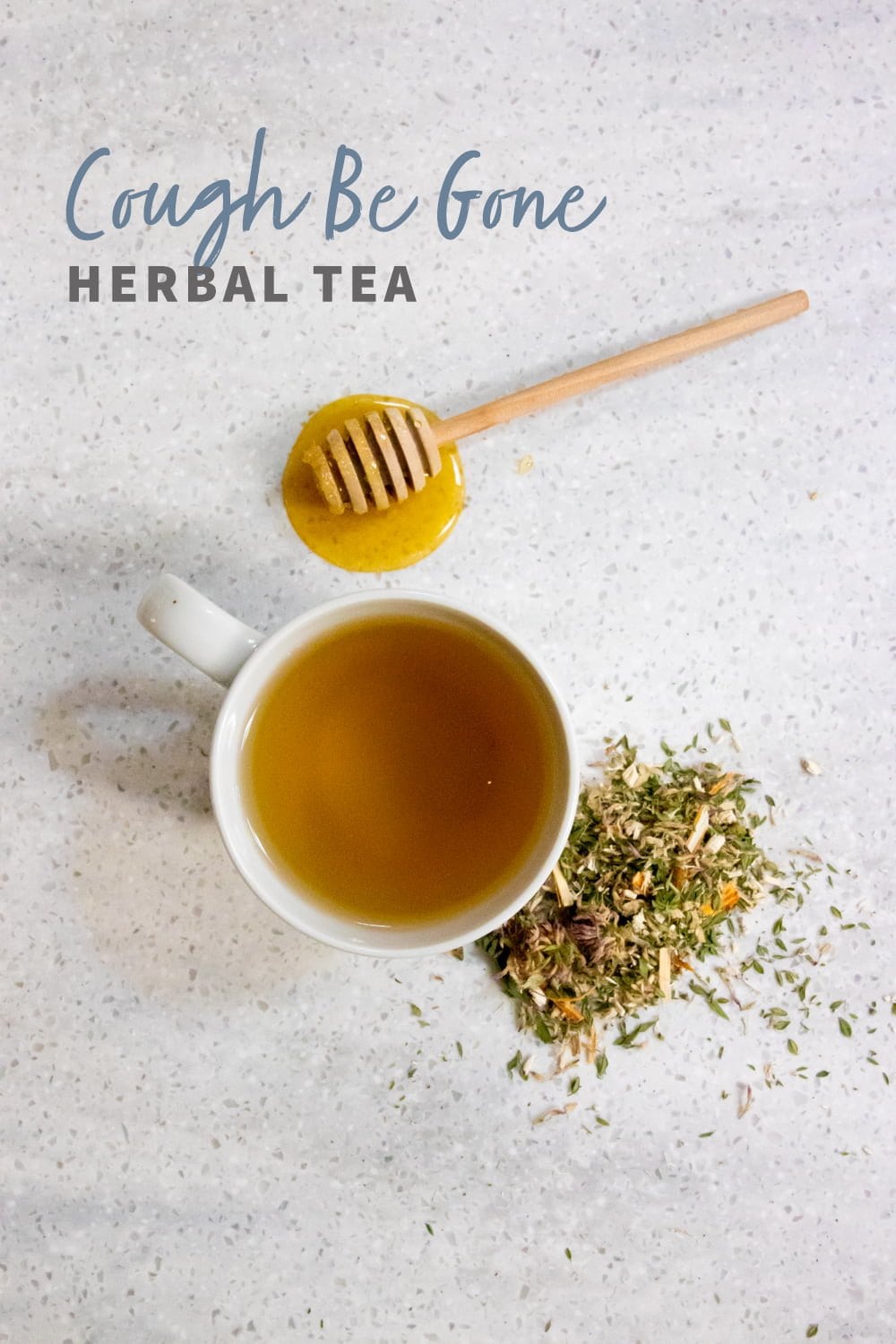
Cough Be Gone Herbal Tea
You’ve almost made it all the the way through your cold, but now you’ve got a hacking cough that just won’t quit. This Cough Be Gone Herbal Tea (with lots of raw honey—nature’s cough suppressant) could really help! The idea with an herbal cough remedy is not to fight against your cough—no stopping it in it’s tracks—but instead getting it to relax and help it’s along it’s way. Wild cherry bark, thyme, and red clover are anti-spasmodic expectorants—meaning they help you clear out the gunk while quelling your coughing fits. Your goal is to get a productive, painless cough that moves your illness along—not a tickly cough that sticks around for weeks. Marshmallow root is a great herb for helping to coat and soothe irritated mucous membranes. Wild cherry bark is a classic cough remedy—and in fact, is the reason most over-the-counter pharmaceutical cough syrups are cherry flavored, a remnant of when all cough syrups were made with wild cherry bark.
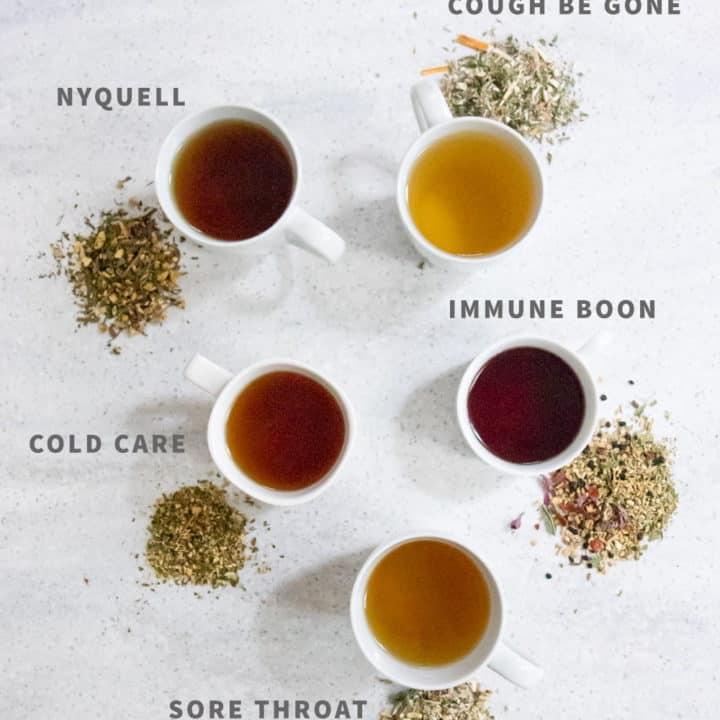
5 Cold-Busting Herbal Tea Blends
When the scratchy throats and runny noses hit your house, break out these five herbal tea blends to get yourself feeling better in a jiffy.
Ingredients
For Immune Boon Herbal Tea
- 1 part dried echinacea leaves and flowers (if available, if not, just leaves is fine)
- 1 part dried rose hips
- 1 part dried elderberries
- 1 part dried astragalus
- 1 part dried ginger root
For Sore Throat Antidote Herbal Tea
- 1 part dried sage
- 1 part dried marshmallow root
- 1 part dried licorice root
For Cold Care Herbal Tea
- 1 part dried yarrow flower and leaf
- 1 part dried licorice root
- 1 part dried elder flower
- 1 part dried peppermint leaf
For NyQuell Herbal Tea
- 1 part dried valerian root
- 1 part dried chamomile flower
- 1 part dried licorice root
- 1 part dried peppermint leaf
For Cough Be Gone Herbal Tea
- 1 part dried marshmallow root
- 1 part dried wild cherry inner bark
- dried thyme
- 1 part dried red clover leaf and flower
Instructions
For All Teas
- Combine all ingredients a large bowl. Store in a labeled airtight jar or container out of direct sunlight.
- To brew: combine 1 tablespoon of tea with 8 ounces of boiling water. Cover and let steep for 30-45 minutes. Strain, sweeten to taste with honey, and serve.
Notes
- Echinacea only gives you a short burst of immune boosting, so drink this only for the first 1-2 days of an illness.
- Because echinacea is a white blood cell count booster, it should not be taken by those suffering from leukemia.
- An allergic reaction to echinacea is rare, but it happens—if you get itchy eyes or other signs of allergy, discontinue use.
- Those with an autoimmune condition should speak with their health care provider before consuming immune-boosting herbs (in particular echinacea and astragalus). In general, it’s a good idea to speak with a health care professional before starting any new herb.
- Astragalus may reduce the effects of immunosuppressive drugs (such as those taken after organ transplant, during cancer treatment, or to treat extreme autoimmune diseases). Astragalus should also be avoided by those taking lithium.
- For some, licorice root can be a mild stimulant—which might not be entirely bad if you’re under-the-weather and need to get through the work day. If after drinking this tea, you feel wired, just reduce the amount of licorice root.
- Licorice root is 50 times sweeter than table sugar, so taste before sweetening! If this blend is too sweet for you, reduce the licorice by half.
- Sage can reduce a breastfeeding mother’s milk flow significantly, so use with caution while breastfeeding.
- It’s recommended to keep sage dosing to less than 15 grams of dried sage leaf per day.
- Licorice contains glycyrrhizic acid, which in large amounts can cause sodium retention and potassium loss, which can cause stress to the heart and kidneys. If you have a history of high blood pressure, heart issues, or kidney issues, only use licorice under the guidance of your health care professional.
- Yarrow in large doses during pregnancy is not recommended due to its stimulating properties in the uterus. If you’re pregnant, leave the yarrow out of this tea.
- Some people with ragweed allergies report allergic reactions to yarrow. I personally have wicked sinus allergies to ragweed and have never had a problem with yarrow, but if using yarrow gives you itchy eyes, a rash, or other allergic symptoms, discontinue use.
- Valerian works as an excellent sedative in the vast majority of people, but for a small amount of folks (about 10% of the population), valerian actually metabolizes differently and is stimulative. If after drinking this tea you feel more wired than tired, valerian root might not be for you!
- Some people have allergies to chamomile. If you get itchy eyes, a rash, or other allergic symptoms, discontinue use.
- A long infusion of chamomile tastes bitter and valerian root isn’t wonderful tasting, so the NyQuell isn’t the most pleasant tasting tea on the block, but it sure does work!
- Red clover has blood-thinning properties and should not be used by those who are on blood thinners, have blood clotting issues, or who will be undergoing surgery in the near future.
- Wild cherry bark does contain cyanide compounds in very small amounts. Do not consume large amounts of wild cherry bark for long periods of time. Also, never use the leaves of wild cherry trees, only the inner bark.
- For the most medicinal benefits: brew at least 1 quart at a time, and then drink 1/4 cup to 1/2 cup of hot tea every hour. Discontinue drinking at least an hour before bedtime so you don’t have to hit the restroom in the middle of the night.
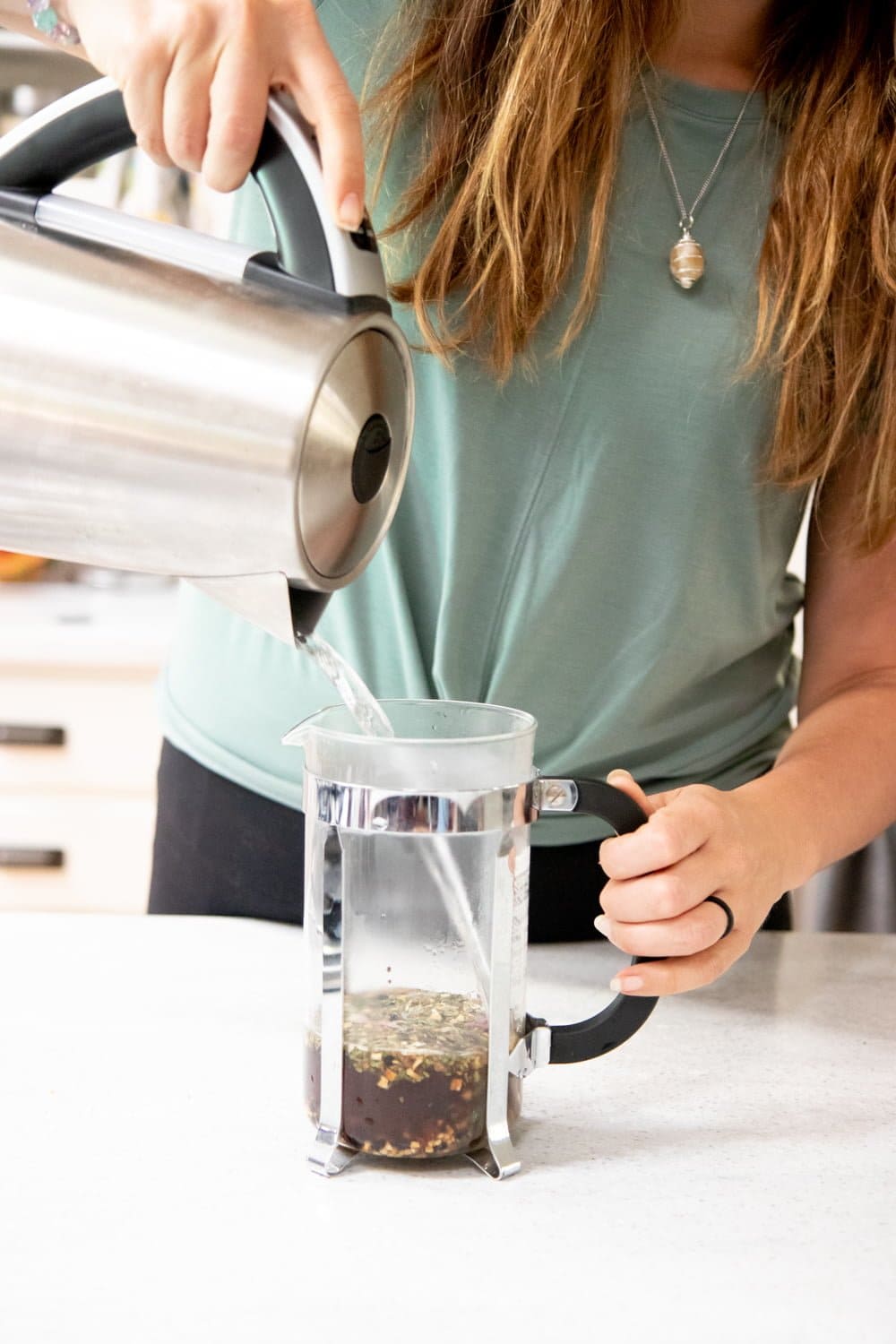
Any of these formulas may also be turned into a tincture for less cozy, less tasty, but more efficient dosages. Just fill a pint Mason jar with about a cup of the desired blend of herbs, then cover with 2-3 inches of high-proof (at least 80, but 90 is better) vodka or apple cider vinegar.
Cover and place in a sunny spot for 4-6 weeks, shaking vigorously daily. Then strain through cheesecloth and bottle into a labeled dropper bottle. Take a good dropperful of the tincture (it won’t taste good!) under the tongue as needed—if the taste is too much for you, you can dissolve it in a bit of water.
An alcohol-based tincture will last 3-5 years when stored in a cool, dark spot. A vinegar tincture will be less potent (you might have to take more) and last upwards of a year.
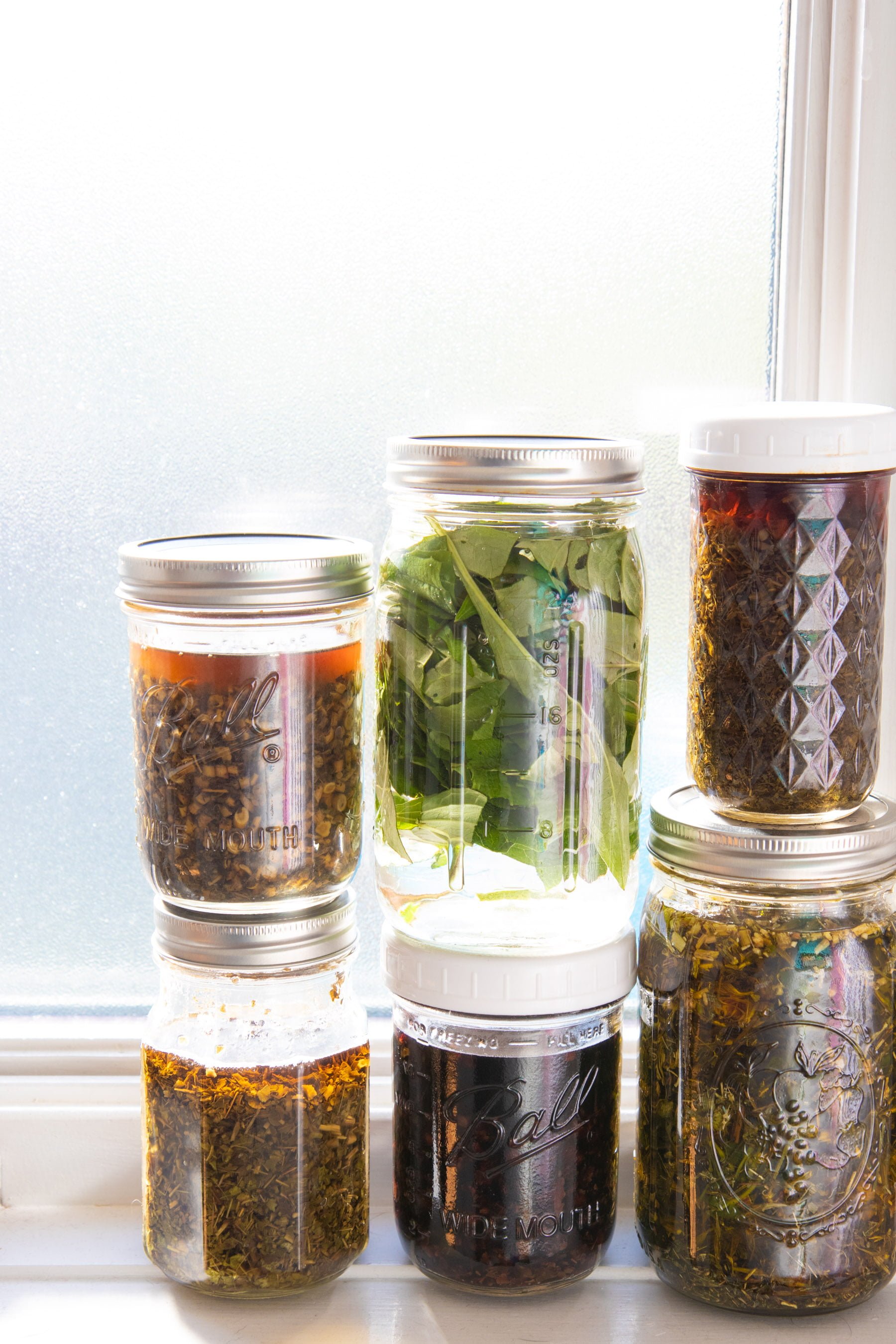
I prefer the tincturing method, in particular, for nighttime herbal tea blends (such as the NyQuell) above so I don’t have to hit the bathroom so much after drinking tea! It’s also a great method for when you need a quick remedy on the go—I have both an anxiety-busting tincture and a headache tincture that I carry in my purse with me for quick dosage while I’m out-and-about when an herbal tea just isn’t feasible.
But if I had my druthers, I’d carve out some time everyday to use the cozy, comforting warmth of herbal teas to treat my ailments every single time. You just can’t beat a cup of healing tea. I hope you and your family stay healthy this winter!

